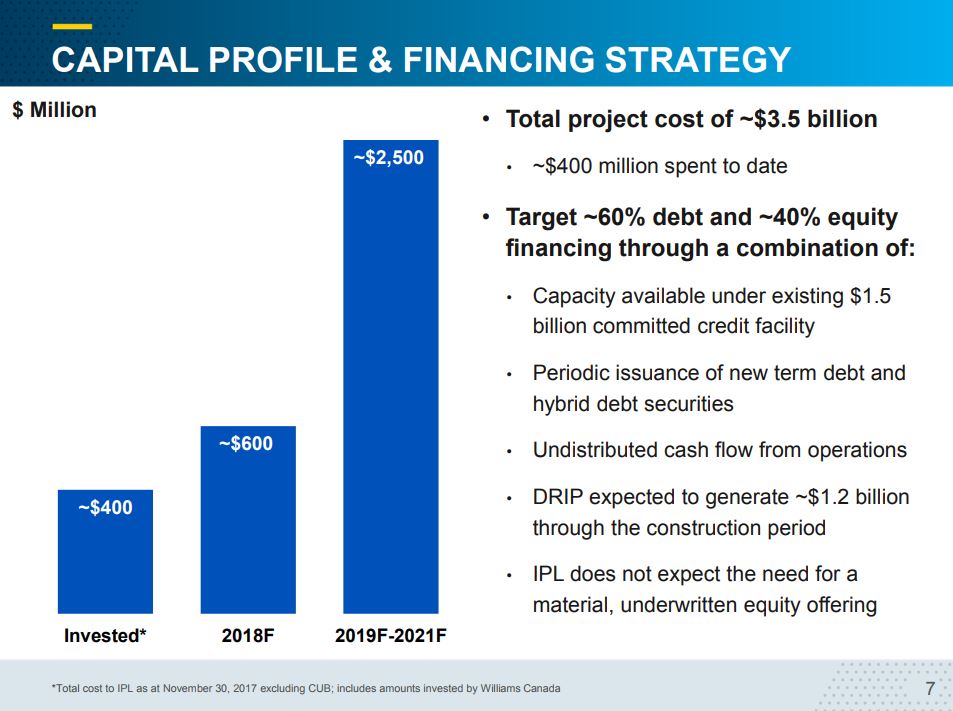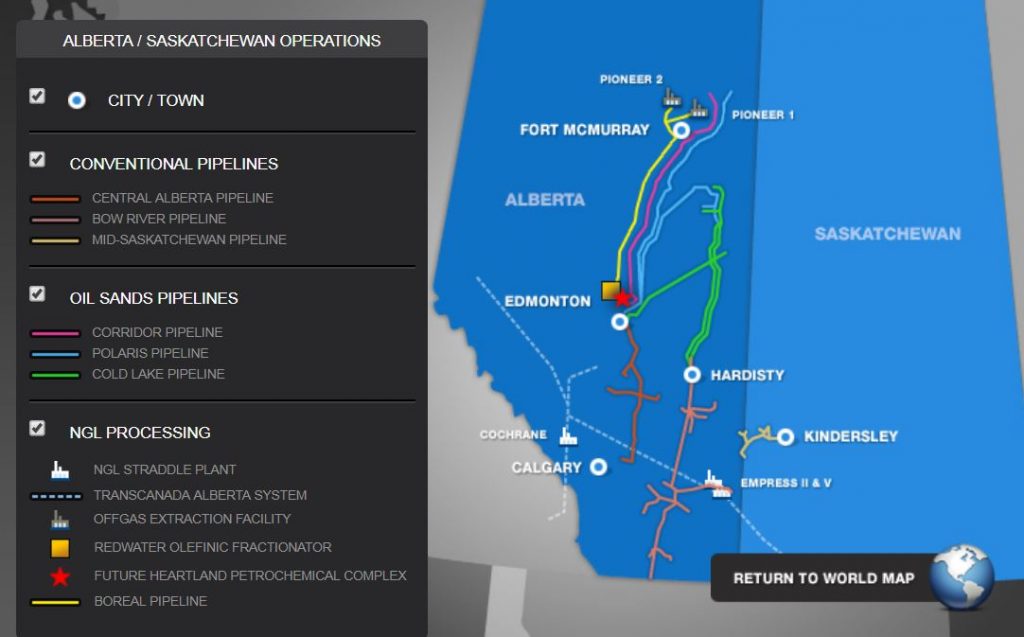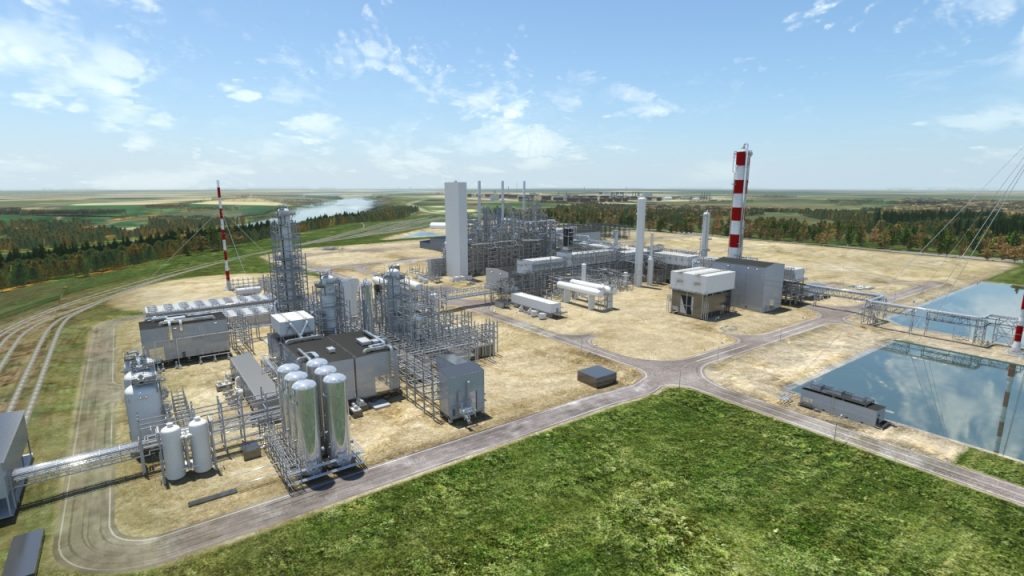Incentives to draw PetroChem developers was Alberta’s royalty credits
Inter Pipeline Ltd. (ticker: IPL) is getting help from the Canadian Government to build a world-scale integrated propane dehydrogenation (PDH) and polypropylene (PP) plant with a price tag of $3.5 billion.
The facilities will be collectively referred to as the Heartland Petrochemical Complex, the $3.5 billion superstructure is designed to process 22,000 BPD of propane into 525,000 tons per year of polymer grade propylene.
The Canadian government’s participation comes in the form of royalty credits. Canada launched a program in 2016 to create jobs by bolstering the construction of new large-scale petrochemical facilities through offering financial incentives for developers. The Alberta Heartland Petrochemical Complex will benefit in incentives through royalty credits valued at $200 million.
In December 2016, a joint venture between Pembina Pipeline Corporation and Petrochemical Industries Company (PIC) was announced. It will receive up to $300 million in royalty credits to build an integrated propylene and polypropylene facility in Alberta’s Sturgeon County. (More details can be found below.)
Investment highlights
- This $3.5 billion project represents the single largest capital investment in Inter Pipeline’s history
- Upon completion, the project is estimated to generate approximately $450 million to $500 million of long-term annual average EBITDA and be accretive to future funds from operations per share
- Inter Pipeline has secured initial binding commercial support for the project from certain counterparties through take-or-pay arrangements
- Facility design is well advanced with approximately $400 million invested to date in engineering, procurement and early civil works
- Construction of the complex will continue in early 2018 with completion scheduled for late 2021
Strathcona County, Alberta, near Inter Pipeline’s Redwater Olefinic Fractionator, will be home to the new Heartland Petrochemical Complex.
Petrochemical Diversification Program provides royalty credits
In 2016, the approved Petrochemical Diversification Program projects were announced.
According to Alberta Energy, up to $6 billion worth of investment will be poured into Alberta, in addition to a maximum of 4,200 new jobs during the building process, and more than 240 fulltime jobs once operation begins.
The program encourages the construction of new Alberta petrochemical facilities by providing large project developers portions of the $500 million in incentives through royalty credits. The Heartland facility scooped up $200 million in royalty credit from the diversification program and will create an estimated 2,300 direct fulltime jobs at peak construction along with 180 fulltime jobs after the facilities are built.
The program was created to encourage companies to invest in value-added facilities in Alberta through financial incentives in the form of royalty credits. Approved projects were selected through a competitive application process.
Developers can trade the royalty credits to oil and gas producers
Here is how the government of Alberta explains the use of royalty credits:
“While petrochemical facilities do not directly benefit from royalty credits as they do not pay royalties, the credits earned can be traded to an oil or natural gas producer. This producer could use these credits to reduce its royalty payments to offset the cost of extracting natural gas and oil.”
According to a CBC report, the Canadian royalty credits will be paid out after the plants are fully operational.
“Instead of shipping our raw resources and the jobs that go with them out of province to places like Texas and Louisiana, we are adding value to them here at home and creating a wide array of value-added products,” Alberta Minister of Economic Development Deron Bilous said. “Everything from detergents, fertilizer, anti-freeze, textiles, and plastics for consumer goods, plastics used to make your cellphone, the dashboard for your car, and toys. Most importantly, this program will help create thousands of new, high-paying jobs for Alberta workers.”
“Alberta is an ideal location to construct a world-scale propane based petrochemical operation,” Inter Pipeline President and CEO Christian Bayle said. “Driven by attractive feedstock and utility costs, the Heartland Complex is expected to be one of the lowest cost polypropylene producers in North America.
“This dynamic should result in attractive profit margins given the premium pricing this plastic currently receives in the North American market.”
Detailed engineering for the plant was awarded to Fluor Corporation in 2013 and is now approximately 85% complete. Inter Pipeline has also completed early civil work at the site in preparation for facility construction activities in early 2018.
Linde Engineering was awarded the front-end engineering design contract for the integrated PP plant in 2017, and work is currently approximately 70% complete. Construction of this component of the complex is scheduled to begin in the second half of 2018.
The project also includes construction of product storage facilities and rail loading assets to facilitate the transport of polypropylene pellets to various North American markets.
“This investment represents the largest organic growth project in our history, and a key part of Inter Pipeline’s growth strategy,” added Bayle. “The Heartland Complex is highly complementary to our existing natural gas liquid processing activities and is structured to provide a new source of material long-term cash flow.”
Other major North American projects
A joint venture between Pembina Pipeline Corporation and Petrochemical Industries Company (PIC) was announced back in December 2016. It will receive up to $300 million in royalty credits to build an integrated propylene and polypropylene facility in Alberta’s Sturgeon County. The project is expected to cost from $3.8 billion to $4.2 billion to build.
During construction of the Pembina/PIC facility, there will be an average of 2,000 to 2,500 workers on site, with more than 150 full-time operations and head office jobs upon completion. The facility will process about 22,000 BPD of propane into polypropylene, the plastic material used in the manufacturing of a variety of products such as automobile parts, containers and Canadian bank notes. Construction is expected to start in 2019, with the facility operating by 2021.
- June 2016: Shell Announces FID for New Petrochemical Plant to Draw from Marcellus, Utica Gas Production
- April 2017: ExxonMobil Picks Corpus Christi for $10 Billion Ethylene Plant
- October 2017: More Gas = More Polyethylene: First of Two 650,000 Tons-Per-Year Polyethylene Lines Begins Production in Mont Belvieu




